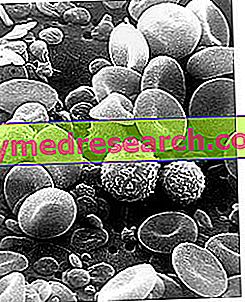Definition
Erythrocytosis (or erythrocyemia) consists in increasing the number of red blood cells (also called erythrocytes) in the blood.
Often, the term erythrocytosis is used as a synonym for polycythemia; however, the latter condition may also refer to an increase in leukocytes or platelets (as well as red blood cells). Erythrocytosis is therefore a more specific term.
Erythrocythemia is found in various conditions. Reversible erythrocytosis occurs in smokers. This depends above all on tissue hypoxia due to the haematic increase in the concentration of carboxyhemoglobin. Erythrocytosis may be secondary to polycythemia vera and to various cancers, including cerebellar hemangiomas, erythropoietin-secreting renal tumors, hepatomas and uterine leiomyomas.
Even in the case of chronic arterial hypoxemia there may be an increase in the erythrocyte mass (high altitude, chronic lung disease, right-to-left intracardiac shunt, renal transplant or hypoventilation syndrome).
Finally, relative erythrocytosis may occur following severe dehydration, burns, diarrhea and other conditions that cause haemoconcentration. In these cases the red blood cells increase only in relative terms (per unit of blood), while their total number does not change.
Less common causes include some congenital diseases such as high-affinity hemoglobinopathies for oxygen.
Possible Causes * of Erythrocytosis
- Polycythemia vera
- Liver tumor
- Kidney tumor
- Burns



